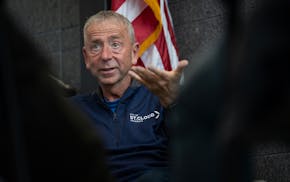Given recent events involving former gubernatorial candidate Tom Emmer and Hamline University, I would like to bring perspective to the university's continuous identity with the core values of our founders, the early Methodists of Minnesota, who envisioned Hamline as a place to educate citizens for lives of civic responsibility and service in an environment of open inquiry, critical thinking, civil discourse and high ethical standards.
Those remain our core values, lived out every day in our classrooms, on our campus, and in the business and civic community.
Regretfully, we acknowledge that our process in our dealings with Mr. Emmer did not rise to the standards that Hamline University upholds as an institution. We take responsibility for that and do not take our shortcoming lightly.
This does not, however, define or change the foundation upon which Hamline was established and has thrived for 157 years: one of diversity, open debate and the expression of divergent points of view.
Hamline works arduously to create an environment that will enable students to deal with the complexity, diversity and change that define the world we live in and to lead successful lives of leadership, scholarship and service.
That means we cultivate diversity at every level, including diversity of thought and opinion.
Hamline lives up to its tradition and its goals. The Hamline University community includes members of every political party and viewpoint among our faculty, our administration and our students.
Faculty members serve as advisors to student organizations such as College Democrats, College Republicans, and Hamline's chapter of the Minnesota Public Interest Research Group.
Diversity of viewpoints in the classroom is expected. Hamline faculty members align course materials with current opportunities in the public arena and utilize materials that present a diversity of views.
For example, an important part of the student experience is that all first-year students are required to take seminars that expose them to divergent views, such as "The Palestinian and Israeli Conflict as Seen by Both Sides," which focuses on helping students understand the history of the conflict through the voices of the people who are part of it, and "The Great World House: Creating Interfaith Community," in which students research various deep values for the interfaith community.
Students learn to write clearly, personally and critically in the formation of their own values.
The student experience is further enriched by diverse offerings on campus. One such example came last October when Hamline University hosted a gubernatorial debate on its St. Paul campus.
Hamline students, many representing a variety of student political groups, filled the audience, and students and Hamline community members submitted questions that were asked of the three leading candidates, Mark Dayton, of the DFL Party; Emmer, a Republican, and Tom Horner of the Independence Party).
Candidates were given equal opportunity to share answers to questions posed by a media panel made up of reporters from the Star Tribune, the Pioneer Press and KMSP-TV, Ch. 9 (a Fox affiliate). It generated the kind of discourse that the university deems essential in the education of its students.
Diversity of opinion within our faculty is real and verifiable. For example, a member of our law school faculty researched and drafted the conceal-and-carry legislation that eventually became Minnesota law, an issue that has passionate supporters and opponents on campus, in the community at large and throughout Minnesota.
For 30 years, Hamline faculty have contributed to and edited the Journal of Law and Religion, a nationally recognized journal of ecumenical scholarship with annual conferences held at the university.
Two of our School of Business professors edit the prestigious Journal for Public Affairs Education. One of the top journals of its kind, the publication focuses on public administration, public affairs and government affairs.
For three consecutive years, Hamline has hosted the Minnesota Economic Association's annual conference. This year's topic was on financial inequality and education.
This fall, Hamline School of Law's Business Law Institute hosted a wide range of scholars, mortgage professionals and lawyers seeking purposeful conversation around the critical issue of reforming the secondary mortgage market.
Graduates of Hamline are in positions of leadership in many prominent businesses, and serve as elected officials from both conservative and liberal political parties in the Legislature; as international ambassadors, and as judges, mayors, state commissioners and sheriffs, to name a few.
On nearly every issue one can think of, we have an abundance of viewpoints.
For those who press the point that colleges and universities are exclusively liberal, we invite them to spend time at Hamline University, and witness for themselves how this institution is representative of our society and intentionally is a place where ideas can be discussed in a safe and open environment.
Like most communities, Hamline has tension when we are discussing matters that pertain to civil and human rights.
While challenging discourse always is welcomed and heard, Hamline has and always will stand firm on its core value -- one that goes back to the very founding of the university: the value and respect for the dignity of every individual.
As Minnesota's first university, Hamline has a long record of the responsible, civil and open exchange of ideas.
As president, I am confident we will continue our respected tradition of preparing students to be independent thinkers, prepared to make a contribution to their communities as engaged citizens and leaders.
* * *
Linda Hanson is president of Hamline University.

Kudos to St. Cloud's longtime mayor
Readers Write: Ethnic studies curriculum, public notice laws, student protests


